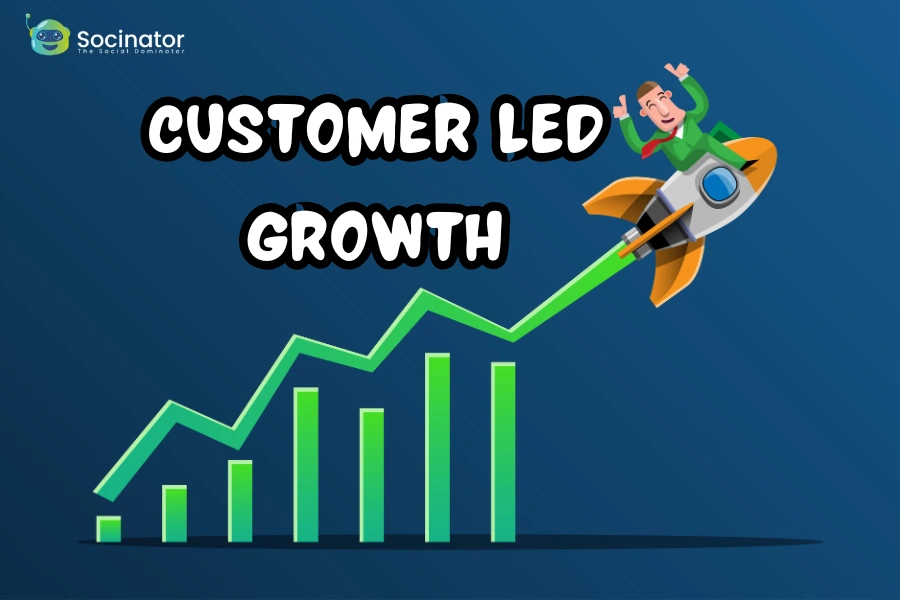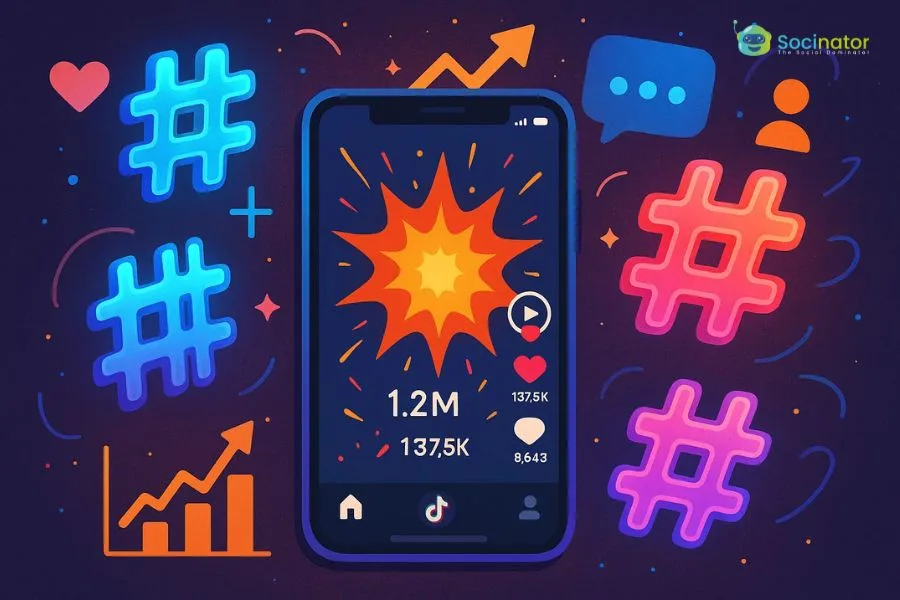Artificial intelligence has quickly evolved from being a buzzword to a practical tool that’s transforming everyday experiences, especially on social media. From casually scrolling through your favorite platform to managing a brand’s digital presence, AI is reshaping how we interact, create, and engage online.
AI is working silently in the background to personalize your feed, enhance your interactions, and even predict what you might want to see next.
Think about the last time you received a product recommendation that seemed almost too perfect, or a chatbot that replied instantly with just the right answer, that was AI in action. Its integration into social platforms is creating more intuitive, efficient, and engaging digital spaces for users and businesses alike.
In this blog, we’ll take a deeper look at how AI in social media is changing the game. From smart algorithms and chatbots to visual recognition and influencer discovery, we’ll explore its real-world applications, major benefits, and what the future may look like with AI at the helm of social media innovation.
Listen To The Podcast Now!
What Is AI In Social Media?
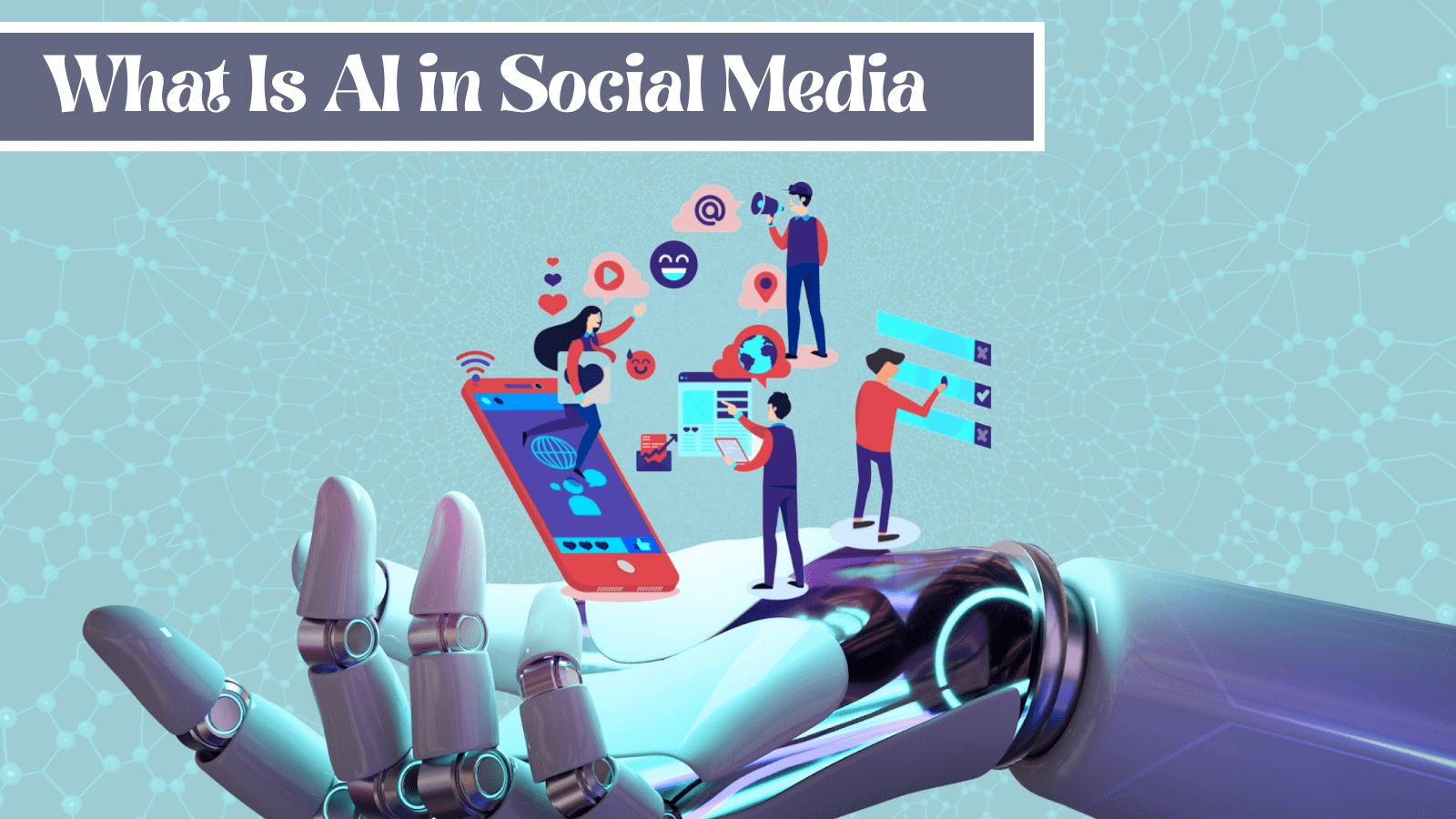 To begin with, what is AI in social media? It’s the use of artificial intelligence technologies to improve how social media platforms operate and interact with users.
To begin with, what is AI in social media? It’s the use of artificial intelligence technologies to improve how social media platforms operate and interact with users.
In simple terms, AI helps these platforms become smarter by analyzing data, understanding user behavior, and making real-time decisions to enhance the online experience.
This can include tools and systems like machine learning (where platforms learn from data), natural language processing (which helps systems understand human language), and predictive analytics (which forecasts future trends based on patterns).
Together, these technologies work behind the scenes to recommend content, detect spam or harmful behavior, and even help brands target their ideal audience.
For example, when you see ads that match your interests or get suggestions for friends or hashtags that feel spot-on, that’s AI at work. Businesses use these insights to tailor content, optimize ad spend, and provide better customer experiences.
AI in social media doesn’t just gather information; it interprets it, giving brands a competitive edge in an ongoing digital environment.
Also Read:
Tag: customer experience analysis
The Growing Influence Of AI In Social Media
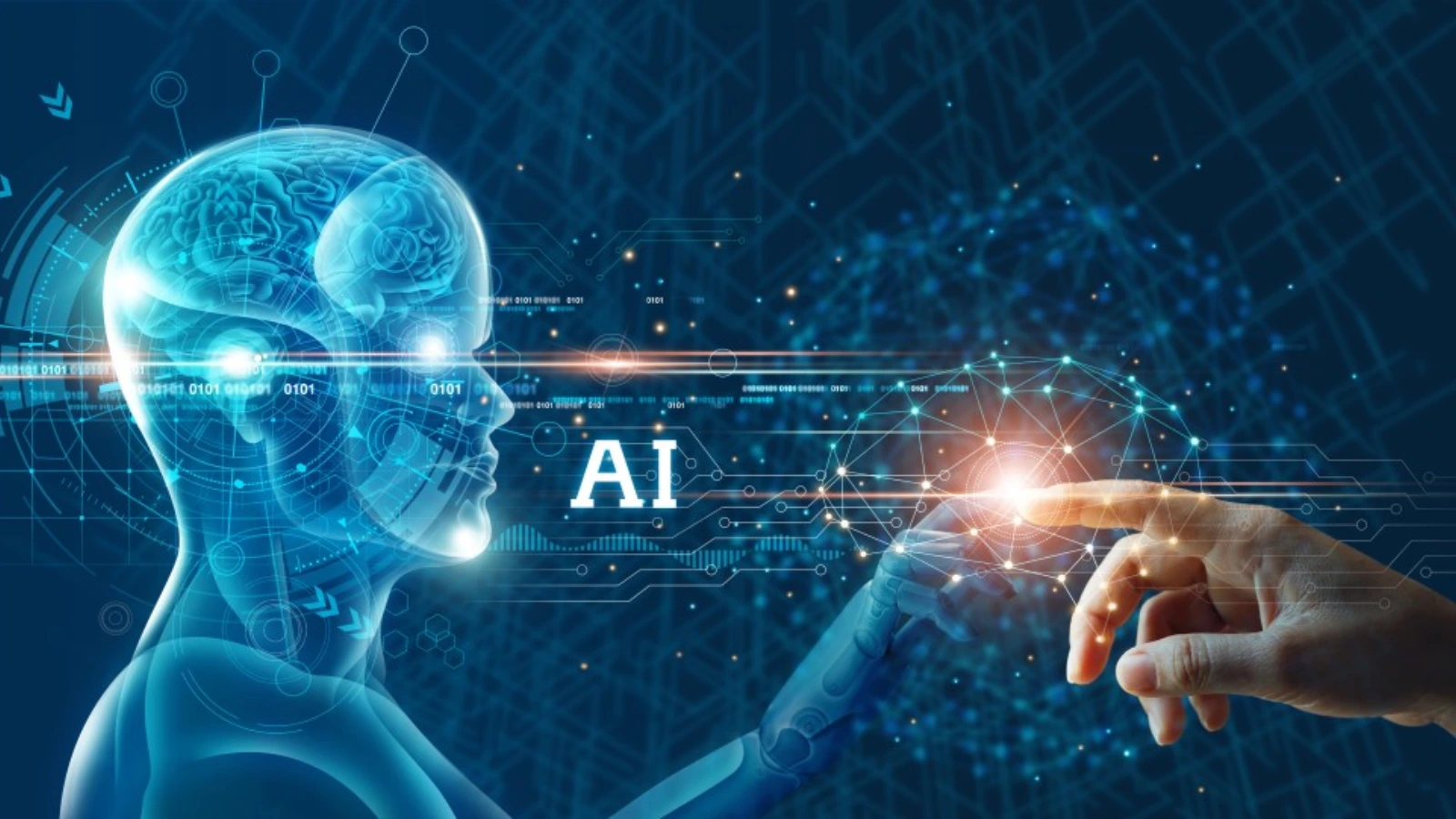 The influence of AI in social media has grown rapidly over the last few years. Platforms like Facebook, Instagram, Twitter, LinkedIn, and TikTok are investing heavily in AI to stay competitive and relevant. Whether it’s through content moderation, facial recognition, or predictive targeting, AI is at the core of nearly every innovation in social media.
The influence of AI in social media has grown rapidly over the last few years. Platforms like Facebook, Instagram, Twitter, LinkedIn, and TikTok are investing heavily in AI to stay competitive and relevant. Whether it’s through content moderation, facial recognition, or predictive targeting, AI is at the core of nearly every innovation in social media.
This trend is not slowing down. With the increasing availability of big data and improvements in machine learning, the influence of AI in this space will only expand. Brands that ignore the power of AI risk falling behind in terms of engagement, reach, and ROI.
How Is AI Used In Social Media Today?
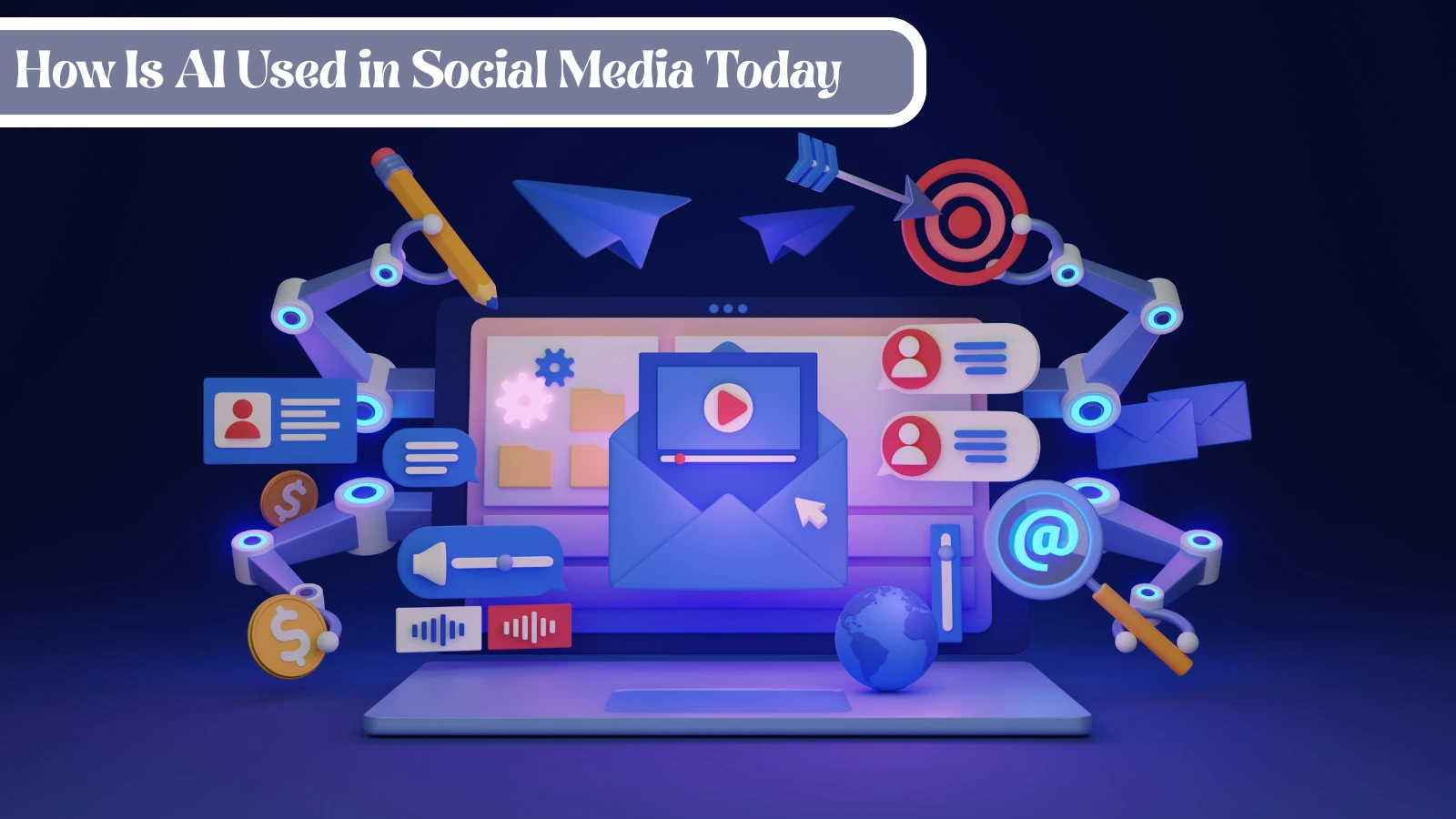 AI is being used in a variety of innovative ways on social media platforms. These tools don’t just help tech companies, they significantly benefit users and marketers by making social media smarter, more engaging, and more efficient.
AI is being used in a variety of innovative ways on social media platforms. These tools don’t just help tech companies, they significantly benefit users and marketers by making social media smarter, more engaging, and more efficient.
From personalized content to advanced analytics, AI is quietly powering much of what we experience online every day.
Here are 7 impactful ways AI is currently transforming the landscape:
1. Personalized Content Feeds:
One of the most visible uses of AI in social media is personalized content feeds. AI algorithms analyze your behavior, interests, and interactions to curate a feed most relevant to you. This keeps users engaged longer, increases ad visibility, and improves the overall user experience.
2. Chatbots and Customer Service:
AI-powered chatbots have become standard across social platforms. These virtual assistants handle inquiries, process orders, and resolve complaints, 24/7. They boost response times, cut down on manual workload, and improve customer satisfaction significantly.
3. Sentiment Analysis:
How is AI in social media used to understand user sentiment? Through natural language processing (NLP), AI can detect the emotional tone behind posts. Brands use this to gauge public opinion, improve campaigns, and quickly respond to crises before they escalate.
4. Visual Recognition:
Visual content is dominant on social platforms. AI enhances this by recognizing objects, faces, and even emotions in images and videos. It automates tagging, filters inappropriate material, and helps brands analyze visual trends and manage user-generated content at scale.
5. Content Generation:
Creating engaging content regularly is a major challenge. AI tools like ChatGPT, Canva, and Lumen5 help generate high-quality posts, captions, visuals, and templates tailored to your brand voice. They analyze audience preferences to deliver content that resonates, boosting both consistency and impact.
6. Influencer Identification:
Identifying the right influencers is critical and time-consuming. AI streamlines this by analyzing engagement rates, audience demographics, and brand alignment. It even detects fake followers to ensure authentic collaborations. Some brands also leverage AI-generated virtual influencers for maximum control and scalability.
7. Real-Time Trend Monitoring:
AI scans platforms continuously to track emerging hashtags, topics, and conversations. This real-time insight lets brands jump on trends as they happen, keeping content timely and relevant. Tools like these empower teams to act fast and tailor strategies based on what’s hot in the moment.
These applications show just how deeply AI is integrated into everyday social media experiences, offering benefits to both casual users and businesses alike.
Benefits Of AI In Social Media
 The benefits of AI in social media are far-reaching and impactful for both businesses and consumers:
The benefits of AI in social media are far-reaching and impactful for both businesses and consumers:
- Improved User Engagement:
AI ensures users are consistently shown content tailored to their interests. This targeted delivery not only makes their experience more enjoyable but also boosts the amount of time they spend on the platform. - Efficiency and Automation:
By automating repetitive tasks such as post scheduling, comment moderation, and FAQ responses, AI allows social media managers to focus on strategy and creativity. - Enhanced Customer Support:
Chatbots and automated systems provide real-time responses to customer inquiries, leading to higher satisfaction levels and quicker problem resolution. - Data-Driven Insights:
AI can process vast amounts of social data to uncover behavioral trends, audience preferences, and performance analytics, guiding businesses toward more informed decisions. - Fraud Detection and Security:
AI systems can identify suspicious patterns, detect fake accounts, and prevent cyber threats, helping maintain platform integrity and user trust.
These advantages make AI not just a tool but a necessity for brands aiming to thrive in the digital era.
Popular Use Cases Of AI In Social Media
AI technology is not just a concept, it’s actively used across various social platforms to streamline operations, improve user experiences, and drive marketing outcomes. These popular use cases show just how important AI in social media has become for users, brands, and marketers alike.
-
Content Optimization and Creation:
AI tools assist in generating optimized captions, hashtags, and even visual content suggestions tailored to the platform and audience. This helps brands maintain a consistent posting schedule while maximizing engagement through data-driven content strategies.
-
Ad Performance Enhancement:
AI analyzes user behavior and campaign data in real time to adjust ad bids, placements, and targeting for better ROI. This dynamic optimization ensures marketing budgets are spent efficiently and campaigns reach the right audiences at the right time.
-
Trend Prediction and Market Insights:
Using vast amounts of data, AI identifies emerging trends, popular topics, and shifting consumer preferences before they become mainstream. Marketers can leverage these insights to create timely and relevant campaigns that resonate with their audience.
-
Influencer Identification:
Finding the right influencer for your brand can be time-consuming. AI tools analyze engagement rates, follower authenticity, and content quality to identify the most suitable influencers for your campaigns. This streamlines partnership decisions and improves the effectiveness of influencer marketing strategies.
What Is the Use Of AI In Social Media Marketing?
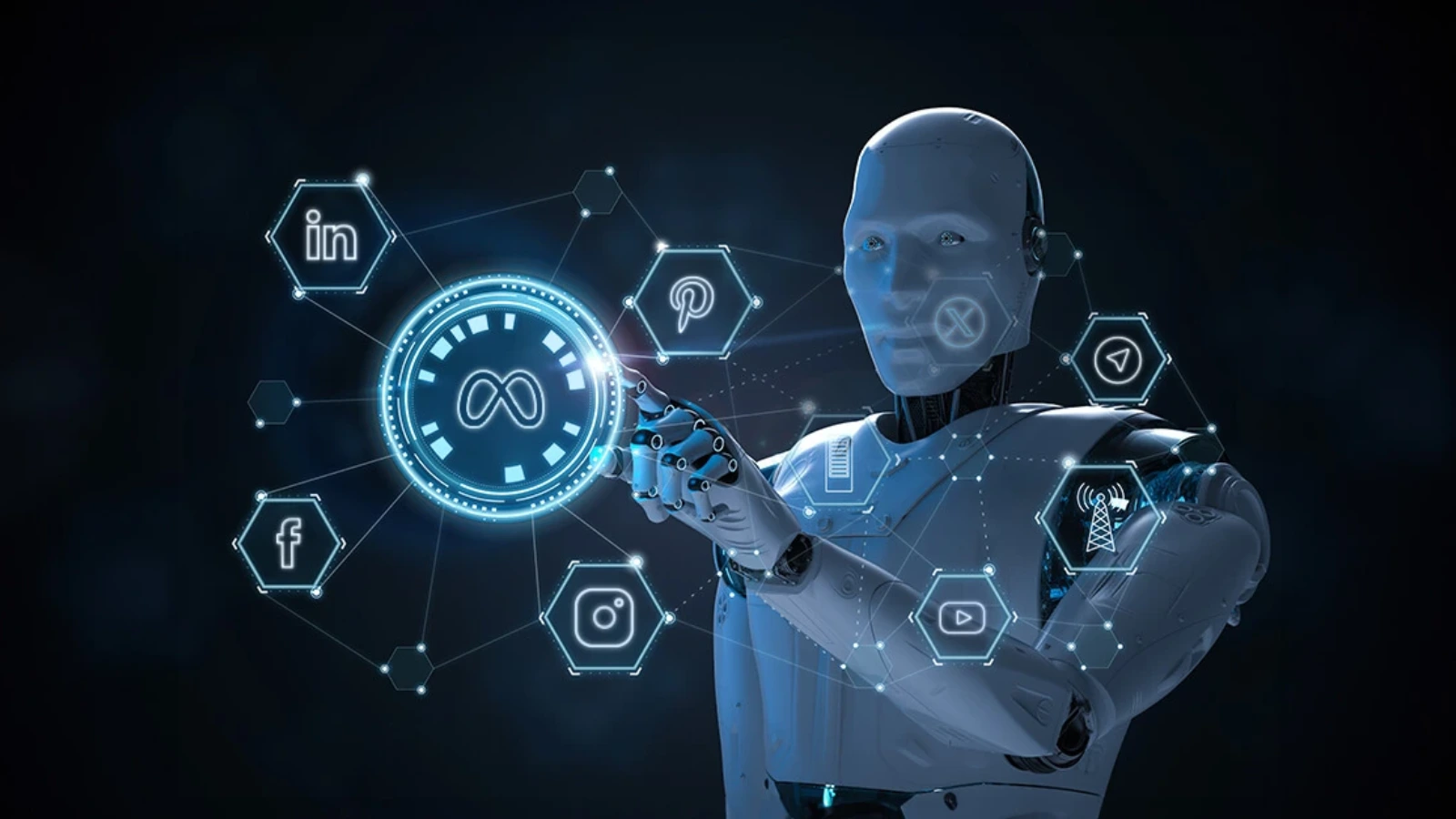 The role of AI in social media marketing is rapidly becoming essential. Rather than relying on guesswork or manual processes, AI enables marketers to build smarter, more effective campaigns backed by real data. It touches every stage of the marketing funnel, from planning & content creation to delivery and analysis.
The role of AI in social media marketing is rapidly becoming essential. Rather than relying on guesswork or manual processes, AI enables marketers to build smarter, more effective campaigns backed by real data. It touches every stage of the marketing funnel, from planning & content creation to delivery and analysis.
Here are some key ways AI is used in social media marketing:
- Optimize Ad Placements: AI analyzes user behavior to determine the best time, place, and audience for ad delivery. This improves ad performance and reduces wasted spend.
- Personalize User Interactions: AI enables personalized messages, product recommendations, and experiences based on individual user preferences, increasing engagement and conversion rates.
- Identify Trending Topics: AI tools scan vast amounts of online content to identify emerging trends and conversations. Marketers can use this data to stay ahead of competitors and create timely, relevant content.
- Schedule Posts for Maximum Engagement: AI can determine when your audience is most active and automatically schedule content for those optimal times, increasing reach and interaction.
AI doesn’t just automate routine marketing tasks, it brings strategy, efficiency, and accuracy to the forefront. With AI, social media marketing becomes more targeted, measurable, and results-driven, allowing brands to maximize their return on investment.
Also Read:
Creative and Tested Social Media Content Creation Strategies for 2024
Types Of Social Media Marketing You Need To Try Now
The Future Of AI In The Social Media Market
The future of AI in the social media market is both exciting and promising. We can expect more sophisticated tools that offer real-time predictive analytics, augmented reality (AR) integrations, and hyper-personalized content delivery.
AI will also play a larger role in enhancing community safety through better content moderation and mental health support tools. As ethical AI becomes a focal point, users will also see improvements in data transparency and control.
Companies are already integrating voice recognition, immersive shopping experiences, and AI-generated avatars. The lines between virtual and real will blur, making social media more immersive than ever.
Will AI Replace Human Marketers?
This is a hot topic. While AI can handle many tasks, it lacks human creativity, emotional intelligence, and the nuanced understanding of human behavior. What it can do is augment marketers by handling routine tasks, freeing them up to focus on strategy and creativity.
This is where social media automation tools come into play. These tools, powered by AI, can schedule posts, track analytics, and even recommend content strategies. However, the human touch is still vital for storytelling, brand voice, and emotional resonance.
Think of AI as a co-pilot. It navigates, analyzes, and even makes suggestions, but the marketer still steers the ship.
One such tool is Socinator, a smart social media management software designed to make your life easier.
How Can Socinator Simplify Your Social Media Management?
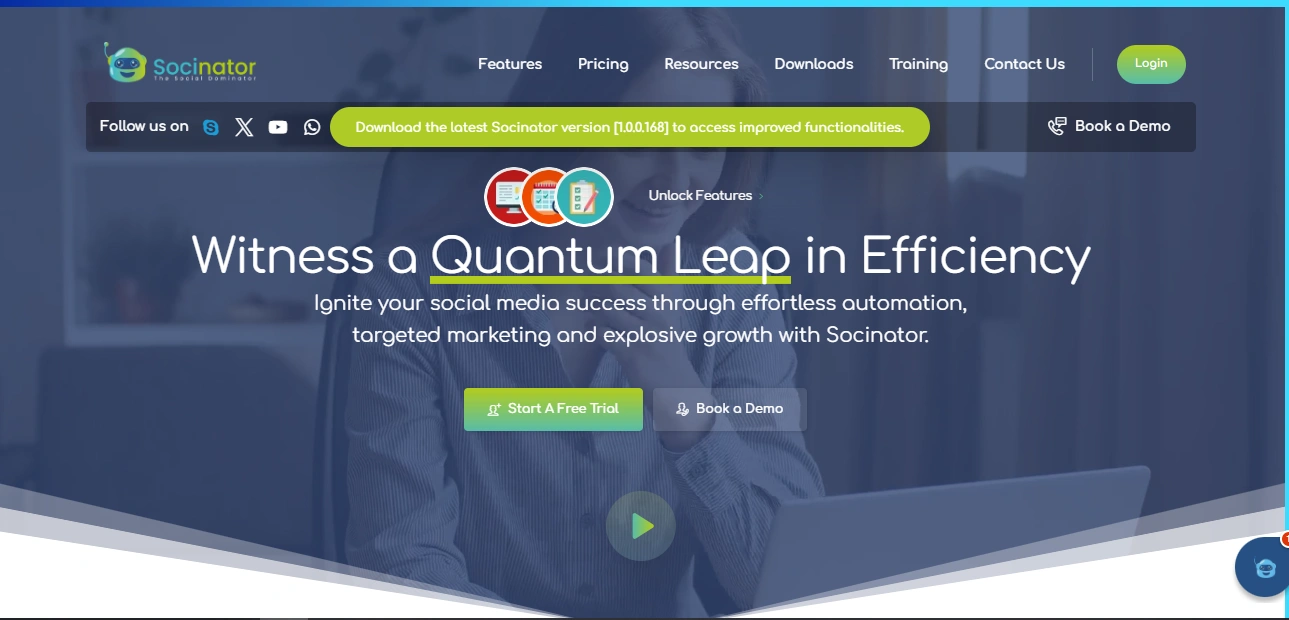 Managing multiple social platforms can be challenging when trying to stay consistent, engage followers, and track performance. Socinator, a smart social media automation tool, helps simplify this process.
Managing multiple social platforms can be challenging when trying to stay consistent, engage followers, and track performance. Socinator, a smart social media automation tool, helps simplify this process.
As one of the top social media automation tools, it offers features like scheduling, targeting, and analytics in one place. It also works as reliable social media management software, allowing you to automate daily tasks and focus more on growth and content strategy.
Here are some key features that make Socinator an essential tool for efficient social media management:
- Social Media Scheduling: Easily schedule posts across multiple platforms to ensure consistent engagement.
- Content Management: Manage, organize, and recycle your content effectively.
- Audience Targeting: Use intelligent filters to reach the right audience based on interests, behavior, and demographics.
- Analytics and Insights: Get comprehensive analytics to measure performance and adjust strategies.
- Automation Tools: Automate routine actions like following, liking, and messaging to save time.
- Account Security: Built-in safeguards to protect your social accounts from being flagged or banned.
With Socinator handling the routine tasks, you can focus on creativity, strategy, and growth.
Final Thoughts
AI in social media isn’t just a passing trend, it’s a game-changing transformation reshaping how we connect, market, and engage online. From personalized content and chatbots to influencer identification and predictive analytics, AI is redefining the social media landscape.
The combination of AI in social media, social media automation, and robust social media management software is setting the stage for smarter, more efficient digital experiences.
Tools like Socinator help businesses automate routine tasks, allowing marketers to focus on creativity and strategy.
As the tools become more advanced, the challenge will be to balance automation with authenticity. Businesses that master this balance will not only thrive but also lead in the evolving digital landscape.
The future of AI in social media is here, and it’s time to embrace it.
Let AI enhance your strategy, but never replace your creativity.
Stay informed, stay adaptive, and let innovation lead the way.
FAQs
1. How does AI impact social media algorithm transparency and user privacy?
Ans. AI significantly affects social media algorithm transparency and user privacy. AI systems analyze vast amounts of user data to personalize content, but this raises concerns about how much information platforms collect and how it is used. Many platforms are under pressure to be more transparent about their algorithms and data practices. Privacy regulations and new technologies aim to protect user data, but balancing personalization with privacy remains a complex challenge.
2. Can AI in social media help detect and reduce misinformation or fake news on social media?
Ans. AI plays an important role in detecting and reducing misinformation or fake news on social media. It can analyze patterns, verify facts, and identify suspicious content faster than humans. AI-driven tools help flag misleading posts, remove harmful content, and prevent the spread of false information. However, these systems are not perfect and often require human oversight to effectively manage nuanced or evolving misinformation.
3. What are the ethical challenges of using AI in social media marketing?
Ans. AI in social media marketing raises ethical concerns like algorithmic bias and manipulating user behavior through targeted content. Marketers must prioritize transparency, fairness, and user privacy to ensure responsible and trustworthy AI use.



